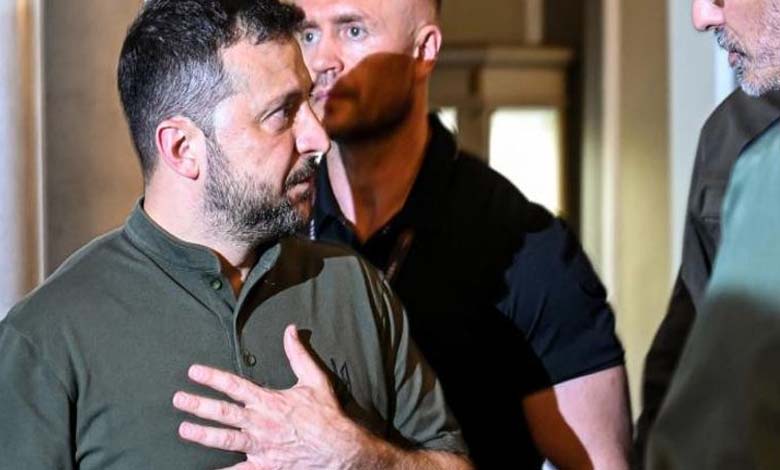Zelensky’s Gamble in the Battle of Kursk: A “Heavy Cost” for Ukraine

Despite Ukraine’s incursions into Russia, the Russians continue to bolster their gains in Ukraine, raising questions about the motives behind this gamble and its potential for success.
-
CNN reveals details of the deadliest Russian attack on Ukraine since the start of the war
-
Attack « Disrupts » Power Supply in Ukraine and Targets Foreign Mercenaries’ Headquarters
From the Ukrainian perspective, the Battle of Kursk is less about a comprehensive military victory and more about amassing additional bargaining chips for future peace negotiations with Russia, according to the Good Governance Foundation’s website. However, this bargaining will only benefit Ukraine if its army can hold more territory compared to what Russia controls before formal negotiations begin. Only then will Zelensky be able to claim that the loss of men and weapons was worth it.
Yet, the margin for any future land-for-land exchanges is narrowing. Any hope for a ceasefire talks, which were planned shortly before the Battle of Kursk, seems to have evaporated.
-
“The Russian Hell” shakes Ukraine… Learn about the “Doomsday” bomb
-
The Ukraine War drains Russian resources and affects its influence in the Mediterranean
Instead, we have witnessed a hardening of Russia’s stance. In a post on Telegram on August 11, Dmitry Medvedev expressed Kremlin anger at Ukraine’s irresponsible actions. He called for Russia to seize Odessa, Kharkiv, Dnipro, Nikolaev, Kiev, and beyond.
The Need for a Moral Victory
According to the report, Ukraine needed to boost the morale of its soldiers and civilians with some kind of victory, at a time when its lines in Donbass were cracking, Western support for free weapon supplies was waning, and the outcome of the U.S. elections was concerning. Perhaps Zelensky thought he had nothing to lose.
-
Russia’s “Victories” in Ukraine: 4 Reasons Behind the Progress
-
Gaza destruction compared to Ukraine’s
Will Kingston-Cox, a specialist in Russian affairs, believes that “this operation (Kursk) seemed extremely ambitious,” especially since “the troops sent to Russia are rapid deployment units,” which were supposed to play a crucial role in building defensive lines while retaining the ability to withdraw quickly.
However, this view is not shared by all observers. Sim Tack, a military analyst who has been following the war in Ukraine since its inception, stated: “I don’t think these units could have changed the balance of power in Donbass.”
-
Nighttime Drone War Between Russia and Ukraine Continues… Exchange of Fire
-
Power Balance Shifts: American Atacms Missiles Open New Avenues for Ukraine Against Russia
Perhaps the Ukrainian General Staff felt it was better to use these units to achieve a significant victory in the Kursk area rather than sending them to Donbass where they would likely have insufficient impact.
Land Exchange
Thus, the territories controlled by Ukrainians in this area could be used as leverage in future peace negotiations.
Dr. Volodymyr Shumakov, a former Ukrainian diplomat, ex-advisor to the governor of Kherson, and political science professor, had previously mentioned that occupying Russian territories, as is happening in Kursk, might later force “Putin to make an exchange, that is, to swap Ukrainian land for Russian land.”
-
Ukraine Awaits U.S. House Light as Shocking Warning Precedes Vote
-
Her fingers to Ukraine… Russia announces new evidence regarding the hall attack
In other words, Kyiv could try, when the opportunity arises, to trade these Russian territories, totaling over 1200 square kilometers, for Russian war spoils in Donbass.
But “if Kyiv really hopes to use Kursk as a bargaining chip, it is likely that these calculations are flawed,” according to Veronika Bonishkova’s analysis, especially since it is not certain that Ukrainian forces will be able to permanently occupy these Russian territories.
Moreover, Will Kingston-Cox adds another reason: “For this Russian region to be valuable as a bargaining chip, Moscow must give the impression that it genuinely cares about it, which is not the case.”
-
Accusations of mutual attacks between Russia and Ukraine as the New Year begins
-
Invisible Battles: Gaza gains international support and sympathy at Ukraine’s expense
In terms of propaganda, it is very important for the Kremlin to show that its top priority is the capture of Donbass, presented as an integral part of Russian territory. Conversely, giving significant importance to the Ukrainian advance in Kursk could make Moscow appear on the defensive, after having had the initiative.
With Ukraine’s gradual withdrawal from Donbass, Zelensky may send more men and equipment to retain the land in Kursk, at a high cost, in a desperate attempt to show that his gamble was not a disaster.
-
Zelensky attacks Netanyahu and criticizes Israeli aid to Ukraine Ukrainian
-
Targeting the Kremlin… Ukraine Fails in Its Counterattack on the Russian Capital
Some Western commentators assume that if Donald Trump is elected president, he might push for a ceasefire. In light of increasing evidence that Ukraine is slowly losing, it is not excluded that Biden might push for a temporary ceasefire before November. However, the lack of Western incentives to encourage Russia to advance toward peace could lead Putin to disregard the position that the new occupant of the White House wishes to give to U.S. foreign policy.











